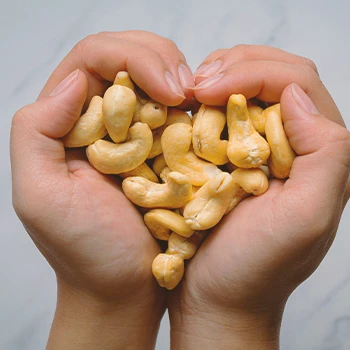Cashews are rich in fiber and healthy fat, which makes them good for weight loss.
As a health optimization coach, one question I frequently get from my clients is whether snacking on nuts like cashews can help increase testosterone levels.
I spent seven weeks researching scientific literature and consulted our dietitian to get a second opinion to put this guide together.
Here is what I learned.
Quick Summary
- Cashews can help boost testosterone levels due to the presence of minerals and healthy monounsaturated fatty acids.
- Cashews can have many benefits, such as improving fertility and sperm count.
- Cashews provide three micrograms of selenium per ounce, contributing to the recommended daily intake of 55 micrograms for men, which is linked to improved sperm quality and increased testosterone levels.
- While cashews offer a natural way to boost testosterone, I often recommend combining them with a balanced diet and regular exercise, which is essential for optimal health and fitness.
Can Cashews Increase Testosterone Levels?

Yes, cashews can increase testosterone levels.
The kidney-shaped nuts are rich in lipids and selenium, linked to higher testosterone levels in men.
The National Library of Medicine mentions they are also a good source of zinc and magnesium, two essential nutrients for male reproductive health [1].
While you should not consume large quantities of selenium in an attempt to boost your testosterone levels, incorporating a small amount into your daily diet is proven to help boost sperm quality and, as a result, increase T levels [2].
According to Harvard's School of Public Health, Cashews provide three micrograms of selenium per ounce serving, with 55 micrograms being the recommended daily intake for men [3].
That said, high doses can cause the following side effects:
- Hair loss
- Fatigue
- Nausea
- Vomiting
- Nail discoloration
- Heart failure
The safe upper intake level for selenium is 400 micrograms daily for both adult men and women. Anything above that can lead to serious health risks.
Related: Best Nuts to Boost Testosterone
What Are the Benefits of Eating Cashews for Testosterone Production?

Eating cashews can offer several benefits for testosterone production, including increased male fertility, improved libido, and support in maintaining a healthy weight.
Let me share how these benefits have manifested in my own fitness regime.
Increased Male Fertility
Cashews, rich in zinc, can enhance male fertility, as fertile men have been found to have higher zinc levels, averaging 14.08 mg/100 ml, compared to infertile men. Multiple studies have shown that without this crucial mineral, sperm quality becomes poor, which results in an increased risk of male infertility [4].
Improved Libido
Cashews contain potassium, monounsaturated fats, and vitamin B6, all of which are proven to be beneficial for restoring testicular function and overall sexual performance [5,6].
Cashew nuts also contain vitamin B-17, which was proven to cause a significant increase in sperm counts, sperm motility, sperm morphological index, and the levels of serum total testosterone [7].
Maintaining Healthy Weight
Cashews are low in carbohydrates and calories, making them a good choice for people who are looking for natural ways to boost their testosterone production while maintaining a healthy weight.
They are also packed with monounsaturated fats, which are “good” fats proven to help with weight loss [8].
Aside from that, although the total fat content of cashews is 46%, research has found that our bodies don't absorb all of the fat found in nuts [9].
“When it comes to maintaining a healthy weight, cashews work wonders. A good source of iron, cashews have a low glycemic index, which means slower digestion. So you feel fuller for longer. Not to forget, a healthy weight and well-balanced glucose levels are beneficial for fertility.”
- Lovneet Batra, Nutritionist
Which Nuts Lower Testosterone Levels?

Nuts that lower testosterone levels are peanuts, pistachios, almonds, and walnuts due to their impact on Sex Hormone Binding Globulin (SHBG) and phytosterol content.
Here is why you should avoid these four types of nuts if your goal is to maintain healthy testosterone levels.
- Almonds and walnuts – These two were proven to raise the Sex Hormone Binding Globulin (SHBG) levels by up to 20% and, as a result, decrease the amount of testosterone and estrogen [10].
- Peanuts – Containing high amounts of phytosterol, they reduce cholesterol levels necessary for the production of sex hormones, such as testosterone [11].
- Pistachios – Another nut rich in phytosterol, a substance you should avoid if your goal is increasing T levels.
Cashews vs Supplements
The National Library of Medicine expresses that cashews provide a more natural and healthy approach to testosterone than synthetic supplements [12].
They differentiate in three ways:
- Cashews provide a natural way to support hormonal health, although their impact on testosterone is indirect.
- They contain zinc and magnesium, important minerals for hormonal health.
- Unlike some supplements, cashews do not pose risks of side effects related to testosterone overdose.
If you are unsure of what products are worth trying, you can start with the list of supplements we tested and approved.
FAQ
How Do Cashews Affect Hormonal Balance?
Cashews affect hormonal balance by enhancing estrogen levels. Regularly including them in your diet can help maintain hormonal health, thanks to their beneficial fats and minerals.
What Other Foods Can Influence Testosterone Levels?
Other foods that influence testosterone levels include mint and licorice root. Unlike cashews, which can boost testosterone, these foods may have a reducing effect, highlighting the importance of a balanced diet for hormonal health.
References:
- https://www.ncbi.nlm.nih.gov/pmc/articles/PMC6907795/
- https://pubmed.ncbi.nlm.nih.gov/31276070/
- https://www.hsph.harvard.edu/nutritionsource/selenium/
- https://www.ncbi.nlm.nih.gov/pmc/articles/PMC6010824/
- https://pubmed.ncbi.nlm.nih.gov/12378824/
- https://www.ncbi.nlm.nih.gov/pmc/articles/PMC5312216/
- https://www.ncbi.nlm.nih.gov/pmc/articles/PMC7641263/
- https://www.ncbi.nlm.nih.gov/pmc/articles/PMC4424766/
- https://pubmed.ncbi.nlm.nih.gov/25351860/
- https://www.nature.com/articles/ejcn2010266#:~:text=Within%20groups%2C%20walnuts%20increased%20SHBG,free%20androgen%20index%20was%20calculated.
- https://www.ncbi.nlm.nih.gov/pmc/articles/PMC6122900/#:~:text=Phytosterols%20increase%20the%20excretion%20of,phytosterol%20supplementation%20is%20a%20hypothesis.
- https://www.ncbi.nlm.nih.gov/pmc/articles/PMC5748761/
About The Author
You May Also Like






